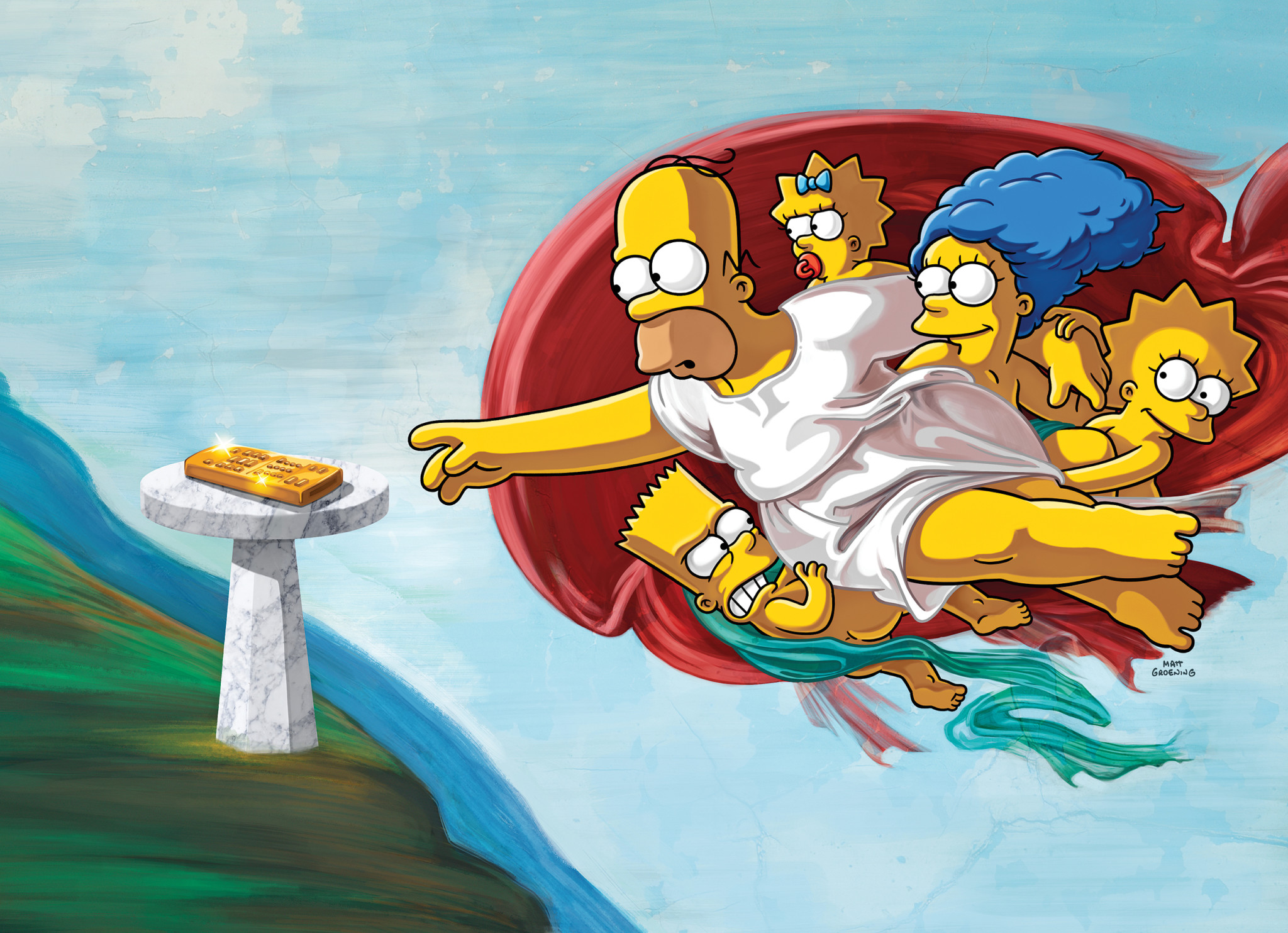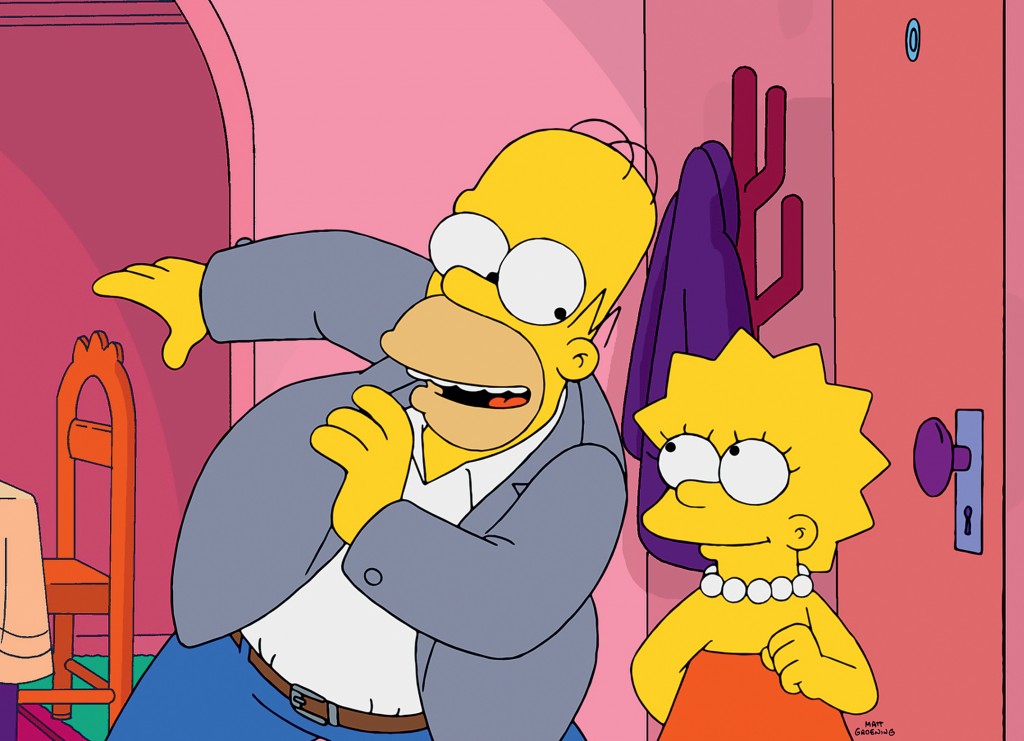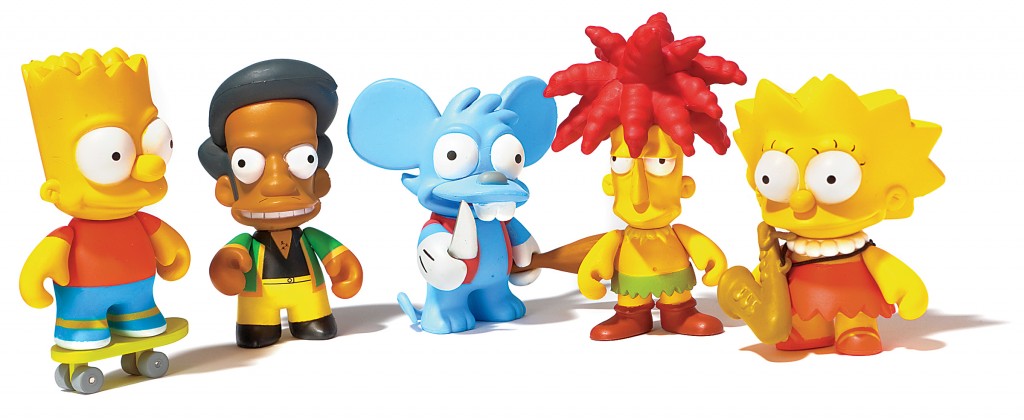Why ‘The Simpsons’ Is the Most Powerful TV Show of All Time

For TV Guide Magazine‘s first-ever Power Issue, the staff looked at the juggernauts dominating TV, from events to franchises to actors, producers, and other multihyphenates in show business. Here, we take a look at TV’s most powerful (animated) show of all time.
The Almighty Power
It’s enough to make any cartoonist—hell, anyone in showbiz—yellow with envy. The Simpsons, born from the mad mind of comic-strip artist Matt Groening, began in 1987 as a bunch of quickie sketches on The Tracey Ullman Show. The raves were immediate, the possibilities unlimited. Two years later, the brilliantly snarky yet poignant adventures of Homer, Marge, Bart, Lisa and baby Maggie debuted as a series on Fox, putting the fledgling network on the map; the show is now the longest-running scripted program in the history of primetime television. (It left the previous champ, Gunsmoke, in the dust six years ago).
Then there’s the ka-ching factor. Ad revenue for the series, at last count, was nearing $6 billion. That’s a lot of Duff beer. But such success comes with a price—well, at least some hefty dental bills.
RELATED: How The Simpsons‘ Longevity Adds Up
“There’s not a day in the writers’ room that we’re not gnawing our teeth off,” says exec producer James L. Brooks, who developed the series with Groening and the late Sam Simon. “We’re always pushing ourselves, policing ourselves, staying on our toes. If you dropped by our offices, you’d never know The Simpsons is a 27-year-old show. We act like it’s Year 1.” The trick to staying fresh, he adds, “is to keep holding hands with innocence. We’re always getting into new arenas: mobile games, theme-park lands, a Simpsons night at the Hollywood Bowl—anything we’re absolutely stupid at. It keeps us vital.”
Of course, the show couldn’t have reached such heights if it didn’t appeal to pretty much everyone. “When we started out, Jim Brooks said, ‘Let’s make this funny for the whole family,’” Groening recalls. That meant delivering gags on multiple levels. “We do jokes for kids, for teens, for grown-ups,” Groening notes. “And this is shocking: There are even jokes for grown-ups who read books.” Awww, man!
Raking in the D’oh
Talk Is Not Cheap
Eat these shorts: Series regulars Nancy Cartwright (Bart), Dan Castellaneta (Homer), Julie Kavner (Marge) and Yeardley Smith (Lisa), who threatened to strike in 2004 if their paychecks weren’t doubled, now earn $300,000 per episode. But consistency is everything. “To hear the same voices season after season is gratifying and comforting for our audience,” executive producer Al Jean says. “These actors are perfect in their parts, and it doesn’t matter to me what they make. If the show’s making money and we can afford what they’re asking for, great! It’s a capitalist system.”
Foreign Legion (of Fans)
Move over, Godzilla. Another global monster is tearing things up! The Simpsons airs in over 100 international markets, including Japan, Turkey and Russia, to an audience of 190 million, which busts the commonly spouted belief that American comedy does not translate well overseas. “Dysfunctional families are universal,” Brooks says. “So are mean bosses. And Homer is an everyman.” Or is he? “I think people around the world look at the Simpsons as typical Americans, so they’re actually laughing at us,” says Jean. “But, hey, when it comes to viewers, we’ll take what we can get.”
Gold Rush
The Simpsons has won 10 Emmys as Outstanding Animated Program (including, in 1997, for “Homer’s Phobia,” above). “The first [in 1990] didn’t come as a surprise,” Jean admits. “The show was already a phenomenon . We were cocky, but we just assumed an Emmy would come along. Now we take nothing for granted.” Especially after the series failed to be nominated in 2014. “That’s the year we submitted our LEGO episode,” Jean says. “Then that great LEGO movie didn’t get an Oscar nomination. So we blame it on them!”
Retail Value
There’s no end to the marketing mania surrounding The Simpsons: More than 500 companies license the characters, and merchandise sales are now closing in on $5 billion. While much of the merch is standard stuff (games, action figures, T-shirts), some of it is wondrously absurd (you, too, can have Homer’s voice on your GPS system). “I like when we actually make fun of all the things we sell,” Groening says. “My favorite: When you pull the ring on the Krusty the Clown doll, he says, ‘Buy my merchandise.’ And then he laughs.”

Mr. Burns gives his employees high-tech eyeglasses in order to spy on them in the “Specs and the City” episode.
Repeat Business
Don’t tell Mr. Burns. Fox made syndication history in 2013 when it sold the show’s cable rights to FXX for an “Ay, carumba”–worthy $750 million, a deal that included a 12-day marathon of 522 episodes (current total: 581). No one dug it more than the man who started it all. “I can only handle a certain amount of Simpsons information,” Groening says. “Every time there’s a new episode, an old one drops out of my brain. That marathon was an astounding experience—like watching a show I’d never seen before!”
The Simpsons, Sundays, 8/7c, Fox













